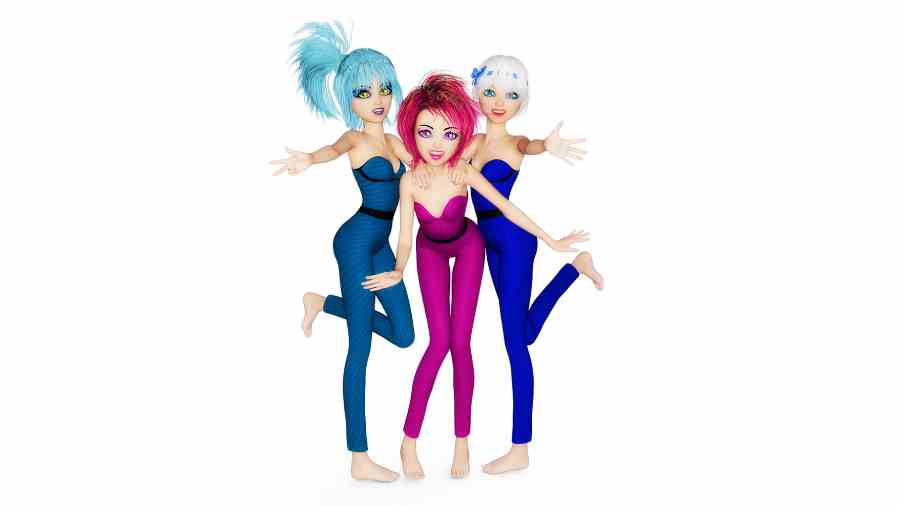Of late, users have flocked to Lensa AI, which uses your selfies and AI to create portraits in a variety of styles. Made by Prisma Labs, the app is generating images — and controversy.
Right now you can get 50 avatars — 10 images in five styles — for $3.99 during a oneweek trial period. “Magic Avatars consume tremendous computation power to create amazing avatars for you,” says Lensa’s checkout page. “It’s expensive, but we made it as affordable as possible.”
Lensa uses Stable Diffusion, a “really powerful” AI-based image generator, said Subbarao Kambhampati of the School of Computing and Augmented Intelligence at Arizona State University, US. Similar to DALL-E 2 and Midjourney, Stable Diffusion uses image prompts and text prompts to generate high-quality images that sometimes get “trippy”, Kambhampati said.
It’s fun to see yourself rendered as a painting or an anime character or a little woodland elf with eyes of two sizes and only one hand, even if you have two IRL.
It’s fun to see yourself rendered as a painting or an anime character or a little woodland elf with eyes of two sizes and only one hand, even if you have two IRL.
However, there are reasons some are bristling at the images. The first is that many users are reporting that the art is sexualising them. When we tested the app, several of the images we received after uploading selfies and selecting “female” included full-body renderings, despite the fact that users are specifically instructed to upload only close-up selfies. One image featured our avatar in a metallic bikini à la Princess Leia in Return of the Jedi. Another included only half a face atop a scantily clad body.
Prisma Labs states on its FAQ page that “occasional sexualisation is observed across all gender categories.”
Thus, it’s fairly simple to use the app to create lewd images of anyone you want. “It turns out the AI takes those Photoshopped images as permission to go wild, and it appears it disables an NSFW filter,” Tech Crunch reported. It gets murky in a hurry.
Yasemin Anders, 29, decided to use Lensa AI after seeing it on social media and was particularly excited to see herself recreated into an ethereal fairy.
She was disappointed to see that Lensa had given her a thinner body and a slimmer face and neck. “If it’s smart enough to turn you into either a fairy or a manga figure, you would think there was some sort of smart enough software behind it to detect fat people, too,” said Anders, who lives in Berlin and works in marketing.
How do artists feel about Lensa? Stable Diffusion was trained on the creations of many artists who did not explicitly consent to the use of their work for Prisma Labs’s profit, Kambhampati said, adding, “If van Gogh was alive today, you’d probably need to pay van Gogh some licensing fee to make your pictures be in van Gogh’s style.” That is not what has happened here.
“To a lot of people, having our art stolen, they don’t view it as anything personal — like, ‘Oh, well, you know, it’s just a style; you can’t copyright a style,’ ” said Jonathan Lam, a storyboard artist who works in video games and animation. “But for us, our style is actually our identity. It is what sets us apart from each other.”
Some of the works being generated by Lensa include what appear to be renderings of artists’ signatures. “All these tech enthusiasts are saying that these generators are creating something new, but if the artist’s signature is still there, it’s not something new,” Lam said. “It’s just generating something based on the data it was fed.”
Prisma Labs wrote that AI “will not replace digital artists” and pushed back against the characterisation that Lensa was ripping off artists’ work. “The AI learns to recognise the connections between the images and their descriptions, not the artworks,” the company wrote.
What about privacy concerns? “I doubt the whole business model is, ‘Give us $10 or $15 and we’ll send you back an AI glam shot’,” said Jen King of the Institute for Human-Centered Artificial Intelligence at Stanford University, US. Lensa AI’s privacy policy claims that “face data” is deleted within 24 hours after it has been processed... but it also states your photos and videos can be used to further train Lensa’s algorithms. Would King use Lensa AI? “No.”
NYTNS










